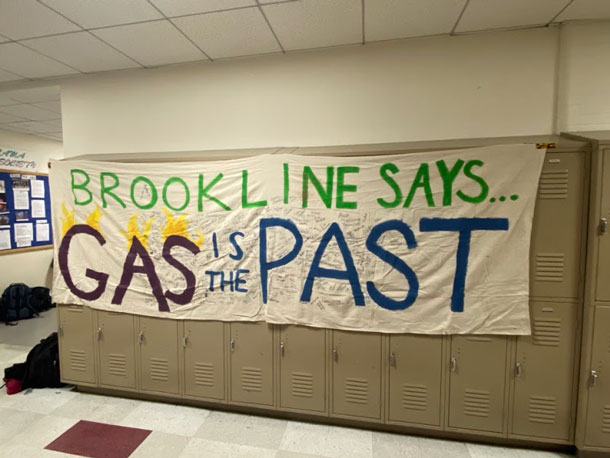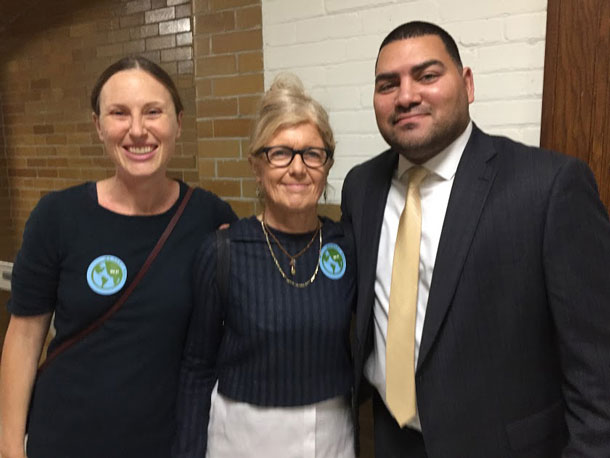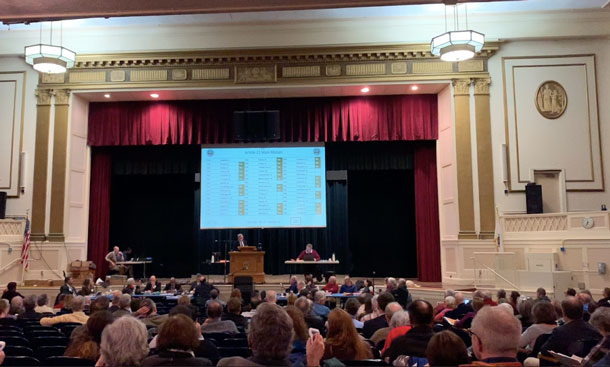Banning New Natural Gas Hookups
Air Date: Week of December 6, 2019

“Gas is the Past” banner made by Brookline high school students and signed by many members of the community. (Photo: Courtesy of Lisa Cunningham)
As scientists warn that time is running out to curb greenhouse gas emissions and transition away from fossil fuels, some towns and cities are enacting bylaws to codify the use of alternatives to natural gas and oil for heating and cooking. Brookline, Massachusetts is the latest town and the first east of the Mississippi to pass a bylaw banning almost all new gas piping in construction and major renovations. Architect and co-petitioner Lisa Cunningham joined Host Steve Curwood to talk about the movement to get gas out of homes.
Transcript
CURWOOD: From PRI and the Jennifer and Ted Stanley Studios at the University of Massachusetts Boston, this is Living on Earth. I’m Steve Curwood.
As government leaders, scientists, and civil society from around the world meet at the UN’s COP 25 climate change negotiations in Madrid, some localities in the US are stepping forward to fill the gap left by President Trump’s refusal to engage. One example is Brookline, Massachusetts, an inner suburb of Boston with about 60,000 residents. Brookline is awaiting final state approval of a bylaw which would largely prohibit the installation of any new oil and gas pipelines in new or substantially renovated buildings. This legislation will be the first of its kind east of the Mississippi and it is expected to cut greenhouse gas emissions by 15% for the town over the next thirty years. Here to explain is Lisa Cunningham, co-petitioner of the bylaw. Welcome to Living on Earth!
CUNNINGHAM: Thank you so much for having me.
CURWOOD: So you're an architect, what are you talking about doing in a building that you might be asked to design to get out of using natural gas?
CUNNINGHAM: So what you can do in terms of your heating and cooling needs is that you can use either air source heat pumps or ground source heat pumps, which many people refer to as geothermal. Right now, these systems are cost effective, and have been used frequently in building construction. The big change is that air source heat pumps used to be not applicable for colder climates in terms of being able to heat in very low temperatures. Now that's changed and air source heat pumps can heat buildings to minus 15 degrees and Brookline never gets that cold.

Three co-petitioners of Warrant-21 Lisa Cunningham, center (Mothers Out Front, Town Meeting Member, architect), Cora Weissboard, left (Mothers Out Front), Raul Fernandez, right (Select Board member). (Photo: Courtesy of Lisa Cunningham)
CURWOOD: Now, although you had almost a unanimous vote in favor of this, I'm sure there were some concerns that came up through the process. How did you address those, so you wound up with a virtually unanimous decision by the town?
CUNNINGHAM: That's a great question. So we actually listened very hard to what our constituents and also what various stakeholders were saying, the questions that they had, and then we actually came up with some exemptions to address people's concerns. So, one thing that we found out early on was that it's very hard to provide domestic hot water for buildings of over 10,000 square feet, so we made an exemption for that. We also made an exemption first for restaurant cooking, because we found out that although a lot of things are possible with restaurant cooking, there are some pieces of equipment that still aren't there in terms of cost. We also established a waiver process so that if there are certain projects that come up, it's very easy to apply for and get a waiver.
CURWOOD: So let me see if I understand your town bylaw, essentially, any new building or something that's being substantially renovated, really has to jump through some hoops if they want to have natural gas pipes.
CUNNINGHAM: Correct. You are allowed to keep your existing piping, but you are not allowed to install or move new piping.
CURWOOD: And what about the cost of this? To what extent is this going to raise costs for people who are doing renovation or new construction?

Warrant Article 21 received overwhelming support at a recent Brookline, Massachusetts town meeting and passed with a majority vote. (Photo: Courtesy of Lilly Cunningham)
CUNNINGHAM: Well, we actually did a lot of research into this. And to our surprise, we actually found out that these systems are essentially cost neutral. There's a very little variation in terms of installation costs. One thing that's also interesting as well is that for low income housing, there's a lot being done. In Brookline already two major building projects that have already started in town are installing air source heat pumps for their heating system and cooling. The residents are thrilled because they will actually be getting air conditioning along with their heating. And the Low-Income Housing Authority in Brookline actually made this decision prior to us bringing this Warrant article to the town.
CURWOOD: Now, I believe Berkeley, California was the first city to have strong restrictions on natural gas in new buildings and there's been kind of a ripple effect. What other cities and towns are you expecting to inspire with this move?
CUNNINGHAM: We are hoping to build a movement around this, the only way we can reduce our carbon emissions is to stop using fossil fuels. And so, we're very much hoping that other towns and cities will follow us. It just makes no sense to install systems that will last for 30 years, when we know we have to be ripping these systems out.
CURWOOD: What role does climate justice play in this bylaw?
CUNNINGHAM: Thanks for asking that question, it's a very important question. Climate justice is a very important part of this bylaw. We felt it was very important to make sure that underserved communities were getting the same benefits of this bylaw, that everybody else in Brookline would get. And we were completely satisfied by the fact that this is very affordable for low-income housing and also as you know, our climate crisis disproportionately affects people who are at risk already. And so this was a very critical part of our Warrant article.
CURWOOD: Lisa Cunningham was a co petitioner of the Brookline, Massachusetts bylaw restricting natural gas in new and heavily reconstructed buildings. Ms. Cunningham, thanks so much for taking the time with me today.
CUNNINGHAM: Thank you so much. It was a pleasure.
Links
Greentech Media | “Rethinking Future Investments in Natural Gas Infrastructure”
WBUR | “Brookline Proposal Would Ban New Natural Gas Connections”
Living on Earth wants to hear from you!
Living on Earth
62 Calef Highway, Suite 212
Lee, NH 03861
Telephone: 617-287-4121
E-mail: comments@loe.org
Newsletter [Click here]
Donate to Living on Earth!
Living on Earth is an independent media program and relies entirely on contributions from listeners and institutions supporting public service. Please donate now to preserve an independent environmental voice.
NewsletterLiving on Earth offers a weekly delivery of the show's rundown to your mailbox. Sign up for our newsletter today!
 Sailors For The Sea: Be the change you want to sea.
Sailors For The Sea: Be the change you want to sea.
 The Grantham Foundation for the Protection of the Environment: Committed to protecting and improving the health of the global environment.
The Grantham Foundation for the Protection of the Environment: Committed to protecting and improving the health of the global environment.
 Contribute to Living on Earth and receive, as our gift to you, an archival print of one of Mark Seth Lender's extraordinary wildlife photographs. Follow the link to see Mark's current collection of photographs.
Contribute to Living on Earth and receive, as our gift to you, an archival print of one of Mark Seth Lender's extraordinary wildlife photographs. Follow the link to see Mark's current collection of photographs.
 Buy a signed copy of Mark Seth Lender's book Smeagull the Seagull & support Living on Earth
Buy a signed copy of Mark Seth Lender's book Smeagull the Seagull & support Living on Earth

